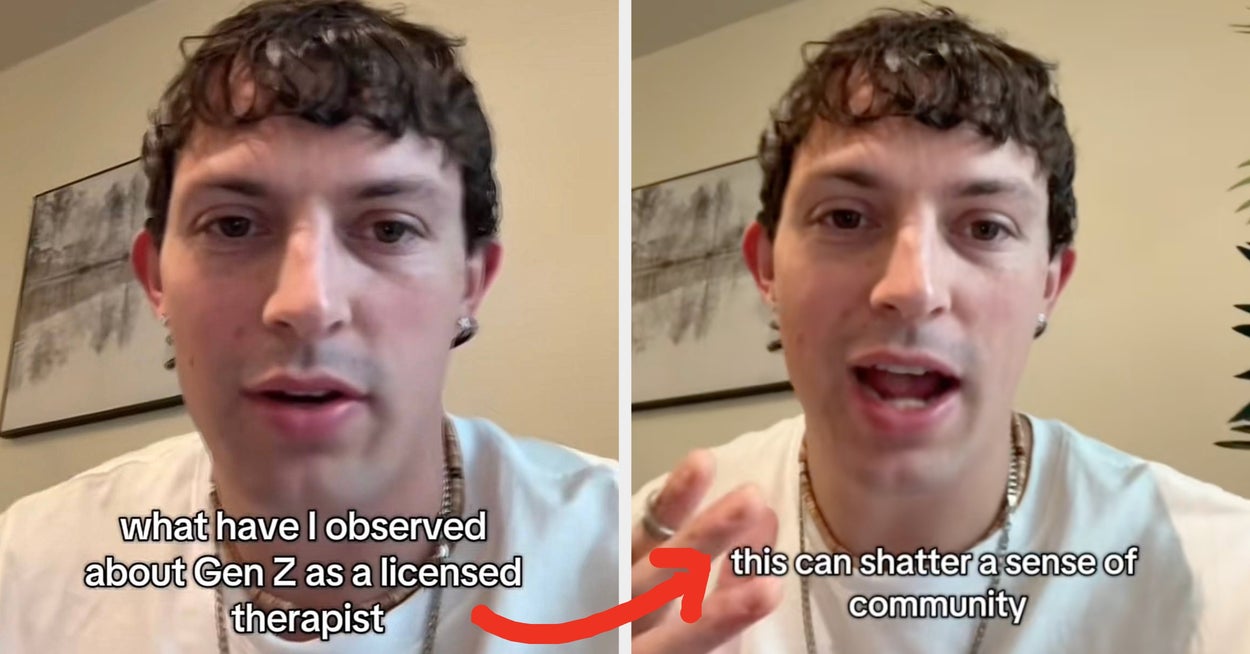Therapist Shares Concerning Gen Z Observations
The kids, or rather Gen Z’ers (who range in age from 13 to 28 years old), are not alright. Gen Z, whose formative years mostly occurred during the height of the COVID-19 pandemic, is struggling in almost every aspect.
Recent studies have shown that Gen Z is both the loneliest and the unhappiest generation. However, when one considers the current political climate, job market, and the prevalence of social media, this general sense of despair begins to make sense…
Which is why Texas-based therapist and independent artist Austin Calo recently went viral for sharing the concerning observations he has made about his Gen Z clients in a video that now has over 2 million views:
He began, “What have I observed about Gen Z as a licensed therapist? So the first thing that comes to mind is an external locus of control, and what that is is…when basically, you have this frame of being that means that something is happening to you rather than you impacting it.”
“A consequence of this, too, that I’ve noticed is higher media literacy, meaning this is a generation that grew up with the internet, they know what you’re trying to do, they know you’re trying to manipulate them, so there’s a sense of, um, kind of collective resistance to, like, pandering, you know?”
Thousands of people, particularly Gen Z’ers themselves, flooded Austin’s comment section, pointing out how spot on his assessment was:
BuzzFeed reached out to Austin to learn more about the topic and ask what advice he would give Gen Z’ers who want to break these cycles:
Firstly, Austin noted that despite the age range of Gen Z spanning over 15 years, he “tend[s] to notice this pattern across the entire generation” and has “consistently observed apparent powerlessness, a lack of meaningful community, a pronounced identification with mental illness and previously pathological labels, a disengagement from calls-to-action relating to media and authority, and a susceptibility to political and social polarization.”
What other factors does he believe are contributing to Gen Z’s apathy? “To me, the potent cocktail is the COVID-19 pandemic occurring during critical phases of development both socially and psychologically for Gen Z, reaching its peak when they’d be developing their autonomy and sense of meaningful influence over their environment.”
“Being a therapist, of course, I see incredibly resilient and courageous clients. The problem I’ve found is that they may not realize that fact,” Austin noted when asked if his own clients have attempted to modify their apathetic behaviors.
The licensed professional counselor explained that as Gen Z ages, “We are likely to see droves of individuals embittered by a constantly cumulating list of milestone achievements that have evaded them. Fewer young people get their licenses freshly at 16 now than ever; fewer young people engage in stimulating and surreptitious partying now than ever; fewer young people have relationships and casual sex now than ever. They spend less physical time with friends now than ever. Their idyllic teenage movie experiences drift more and more into fantasy with each subsequent catastrophe.”
He explained that he has found empathy from older generations to be disappointingly nonexistent, “I’ve found most responses to be disconcerting, whether it be by intent or ignorance. Yes, previous generations have had it hard. No one is denying that. However, Gen Z is being exposed to a very unprecedented combination of catastrophic challenges to the ego and esteem: climate change, the COVID-19 pandemic, political and social polarization, and economic division and desolation. To add insult to injury, those factors are exponentiated by disruptive and malevolent short-form content vices, slowly eroding one’s sense of tangible community and self-assurance.”
Finally, if Gen Z’ers are looking to make changes in their own lives, Austin advises, “Boldly challenge the voices in your head and incessantly trace them until you’ve found the source. All ideas have an origin. By means of introjection, we wear others’ ideas all the time, like we would an older sister’s clothing. Just because we’ve worn it, it doesn’t make it ours. You might find your actual voice is far more encouraging, hopeful, self-assuring, and kind than you may believe.”
Gen Z is facing unprecedented challenges, but ultimately, only time will tell how they respond to them. I’m curious to know, Gen Z’ers, have you noticed these behaviors in yourself or your peers? Older generations, what are you noticing about Gen Z? Share your observations, thoughts, and concerns in the comments!
You can keep up with Austin on TikTok!

